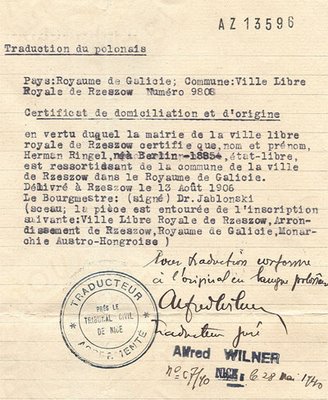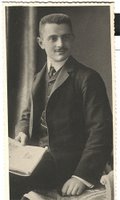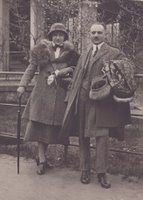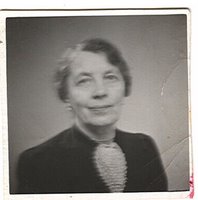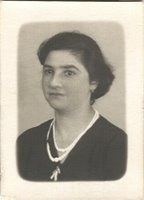The other day I posted information about the military draft in the U.S. for World War I. Our grandfather Walter Ruby registered in the draft, was called up, and fought and was seriously injured in the war. Our German grandfather, Hermann Ringel, also fought in the war on the other side.
I was curious about German Jewry and its response to the war, so I dipped into Amos Elon's "The Pity of It All--A Portrait of the German-Jewish Epoch, 1743-1933" for these excerpts:
"When war actually broke out, five weeks after the assassination, middle- and upper-middle-class urban Jews did not 'go home.' They joined up. By volunteering for war sevice long before being called up they hoped they would finally overcome the remaining informal impediments to full integration in German society....
The common experience of war was generally expected to cement firm new bonds among Germans of all faiths. The term used for that experience was
Erlebnis. A young Jewish volunteer, Julius Holz, invoked his
Erlebnis on December 7, 1914, his twentieth birthday, in a letter to his father from the front. He vowed to 'fight like a man, as a good German of true Jewish faith and for the greater honor of my family.' ...
In the main urban centers, liberal, leftist, and perhaps even some pacifist Jews were swayed by the prevailing emphasis on Russia. It was easier to endorse a war directed against the last despoitic and openly anti-Semitic regime in Europe....
In a speech he gave on August 4 affirming his government's decisio to go to war, the kaiser solemny assured his audience by proclaiming that differences of religion, political affiliation, class, and ethnic origin no longer counted. He said: 'I no long know any aprties, I know only Germans,' at which point the Reichstag broke into a 'storm of bravos.' ....
Jewish volunteers and conscripts felt very little hostility in the ranks. In the name of the kaiser's 'civic truce,' the military authorities ordered the more radical anti-Semitic periodicals to refrain from anti-Jewish agitation.
The Zionists were still a negligible minority among German Jews. At a conference just sight weeks before the war, they had reaffirmed their conviction that they were aliens in Germany. Once war was declared, though, they joined in with as much--and often more--enthusiasm than others, ready if necessary to shoot at French or Russian Zionists.
The Zionist
Judische Rundschau, in its first issue after the outbrak of war, exhorted reader to volunteer unhesitatingly and en mass....
German Zionists already settled in Palestine hurried back to volunteer....
Large parts of the Pale of Settlement in Russia soon came under German military rule. Nearly everywhere, Russian Jews welcomed the German troops as liberators....
[Lots of great detail about Jewish pro-war sentiment, including from Freud and other intellectuals, followed by rising disillusionment as the war dragged on.]
Far from unitying Germans and Jews, the ware seemed only to deepen the gulf between them. As soon as the war turned sour, chauvinism turned inward....
Such feelings were exacerbated by the sudden influx of impoverished Jews from occupied Poland and Russia. Living in abject conditions on the edges of the larger cities, they elicited revulsion....
In October 1916, when almost three thousand Jews had already died on the battlefield and more than seven thousand had been decorated, War Minister Wild von Hohenborn saw fit to sanction the growing prejudices. He ordered a 'Jew census' in the army to determine the actual number of Jews on the front lines as opposed to those serving in the rear....
The Jew census had a devastating effect on German Jews, generating an unprecedented moral crisis among those on the front line....
In 1914, Eranst Simon had fully shared the 'intoxicating joy' of going to war. The Jew census was a 'betrayal:' the dream of community was gone. In one horrendous blow, the census reoped the deep chasm that 'could not be bridged by common language, work, civilizaton, and custom.' ....
Only two years earlier, Nahum Godmann had hailed the gloried of Prussian milarists and their wonder war. Now he wrote that Jews had nothing to do with this war: its origins, its aims, its content were totally alien to them. It was taking place outside their sphere.....

[I'll stop there. This book has lots of great content about Jewish life in Germany until it was obliterated by the Nazis. I'll return later with excerpts about the Zionist movement and also the Jewish reaction to the rise of Hitler. For now here is a photo of Hermann Ringel in uniform as a German soldier during WWI.]

